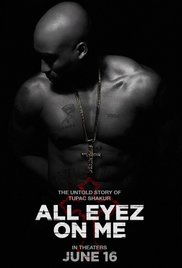All Eyez on Me – 3.5/5 – Movie Reviews by Ry!
 All Eyez on Me – 3.5/5 – When I think about bio-pics, the first word that comes to my mind is journey. When you watch these films, you experience a path into a specific person(s) world. No matter what era, age or circumstance, they provide an experience unlike any other. Even for the unique lives some of these people live, films (of this genre) must find a balance between truth and entertainment. A bio-pic about the late rapper Tupac, All Eyez on Me provides a window that mixes melodramatic storytelling with an eye on retrospective. Even if there are clichés that abound, All Eyez on Me provides an entertaining journey for the life of Tupac Shakur.
All Eyez on Me – 3.5/5 – When I think about bio-pics, the first word that comes to my mind is journey. When you watch these films, you experience a path into a specific person(s) world. No matter what era, age or circumstance, they provide an experience unlike any other. Even for the unique lives some of these people live, films (of this genre) must find a balance between truth and entertainment. A bio-pic about the late rapper Tupac, All Eyez on Me provides a window that mixes melodramatic storytelling with an eye on retrospective. Even if there are clichés that abound, All Eyez on Me provides an entertaining journey for the life of Tupac Shakur.
Premise: The Bio-pic of Rapper, Tupac Shakur
At the heart of the film is Tupac Shakur, played by actor Demetrius Shipp Jr. Even if on the surface the characterized design feels typical, there’s subtle layers that come through the actor’s portrayal on the big screen. From the honest approach through his well-known mannerisms, Shipp Jr. provides a wealth of familiarity that strikes a balance between humanistic aspect within a caricature of Tupac. No matter if he is interacting with family, friends or any other random character; you get to see ‘who’ the man is behind the façade. Through the simplistic context of the bio-pic aspect, it provides a window for some raw emotional value. At the same time, there isn’t anything that provokes a gripping endearment for a personal perspective. With little more emotive techniques, Shipp Jr could have provided a well-rounded character (on screen). For the rest of the cast, you can refer to the IMDb page. The secondary cast provides a believable world around Tupac. From his childhood to the heights of his musical stardom, you see purpose, power and reverence in who influenced the man (through the years). No matter the good and bad that happened, you felt a sense of realism through other characters on this journey. There are times when the one-dimensional aspects become obvious, but it never hinders the film’s experience.
The direction is a tale of two halves. In this common outline, the story starts from the ‘present day’ motif as an introduction to the character(s). Once the film provides a specific perspective, it then plays back through the ‘history’ of the character. Once we get to the ‘present day’, the film goes down a defined path that ‘re-lives’ the rest of the moments to an inevitable story conclusion. This technique is used a lot in bio-pics. With this approach, the experience becomes a mix bag of explanation, thematic detail and characterized drama. With the added aspect of specific biographical moments, you get that proverbial ‘journey’. In this film, we watch as the ‘present day’ motif starts with Tupac in prison. From this defined perspective, the audience is lead into the first half through the ‘interview the character’ narrative technique. Tupac (through his words) brings to life his childhood, adolescent years and ‘rise’ through the hip-hop world. We experience the ideal ‘who, what, where and why’ scenarios of the main character. Through a retrospective aspect, the direction provides layers, purpose and flaws on what made Tupac. Through the ‘ups and downs’, we experience humanistic detail that most wouldn’t know. Even with some typical melodrama scene to scene combinations, you put a ‘puzzle’ together that provides an understanding of the details; knowing what ideas mattered most to the man. Once the first half of the film builds up the characterization to the ‘present day’ motif, we move into the second half. Here, the story begins to jump between the melodrama of the entertainment to the ‘down to the earth’ characterization of Tupac Shakur. There is an ambiguous sense to the direction, creating a fragment in telling a story but trying to add style to the ‘journey’. This causes (at times) a film to feel uneven in tone. Even so, it never falls off the edge or become too cliché. Once this second half leads into the final moments, we are come with a feeling of shock in its predictable story beat climax. As the film comes to its epilogue, it rolls off through the common scrolling of accomplishments. This provides how significant an impact Tupac had on the culture and the world of hip-hop.
The visuals are simple aesthetics of the time in Tupac’s life. With aspects of living through the 80s and 90s, the cinematography doesn’t play too much into the film’s story. The score helps provide a lively approach. With aspect of different beats, song and other influence from hip-hop and rap; the music helps provide that extra value to the film.
All Eyez on Me provides a common approach to a person that had many different layers in his life. Even if there are clichés that abound the storytelling, there is still enough here to provide something enjoyable. If you’re a fan of bio-pics or hip-hop in general, this is one for you. This is a film that is worth seeing at the theaters.